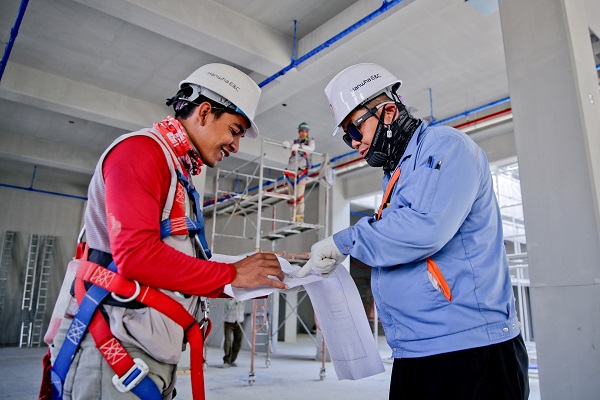With a master’s in construction management degree, one of the highest-paying master’s degrees, you might go on to become a construction manager. In this career field, your daily duties will most likely depend on which stage of construction your current project is in at any given time. Many of the job duties that are important for a construction manager fit into either administrative responsibilities or supervising the job site.
The Administrative Side of a Construction Project
What makes the role of a construction manager most different from other workers in the construction industry is the administrative aspects of the job. A construction manager doesn’t just show up to the job site and get to work. Instead, he or she handles duties in contract administration, cost estimation and budgeting, work timetables and scheduling and more, according to the United States Bureau of Labor Statistics (BLS).
Getting the permits required for construction falls under the job duties of a construction manager. So does recruiting workers to perform general and specialized work on a construction site, which adds a human resources component to the job of a construction manager. Throughout the performance of the work, the construction manager is in charge of making sure that costs are under budget and accounted for, as well as keeping the project on schedule.
Selecting building materials and coordinating the delivery of supplies and equipment to the job site are all duties that the construction manager may be involved in before construction on a building even begins and throughout the process.
Supervision of the Construction Site
IMAGE SOURCE: Pixabay, public domain
Once the crew breaks ground on the construction site, the construction manager is the one who oversees all activities there. In particular, construction managers are responsible for two elements when supervising the workers and their performance: safety and quality.
To keep workers safe and minimize the risk of accidents and injuries, construction managers must make sure that all the crew and job site follow all safety rules and regulations. Workers may be tempted to disregard protocol or otherwise cut corners to save time and money, but doing so can pose a danger on the job site or, in the future, in the form of an unsound building. A construction manager’s focus on safety is particularly important due to the dangers of working in this industry. The construction industry accounted for one in five fatal workplace injuries that occurred in private industry jobs in 2019, according to the Occupational Health and Safety Administration.
The construction manager is also responsible for supervising the quality of the work. Serving as the link between the construction crew and the client for whom the work is being done, the construction manager is in charge of overseeing the quality of the work to make sure it meets the client’s expectations.
A construction manager supervises all of the different personnel on the job site, which may include multiple teams and individuals who work in different areas of construction. Some of the types of workers a construction manager may supervise include carpenters, electricians, plumbers, drywall installers, stonemasons, ironworkers, glaziers, construction equipment operators, painters and other general contractors and skilled trades workers. Construction managers also collaborate with civil engineers and architects as well as building inspectors employed by the government and the client’s project manager.
Depending on the size of the building project, there may be multiple construction managers responsible for overseeing different teams of workers, all reporting to one senior construction manager.
Preparing to Meet the Daily Duties of a Construction Manager
Because the field of construction management requires so much – technical skills in the construction industry, business administration skills for managing project costs and timetables, leadership skills to be a good supervisor and more – a combination of education and experience is preferred. Many construction managers start out in roles like carpenter or glazier (glassworker), according to U.S. News & World Report. Although these jobs are usually taught through apprenticeships, having a formal college education is still common for construction managers, with O*NET reporting that 90 percent of the field has a bachelor’s degree.
A highly skilled carpenter may still struggle with the business side of construction management without taking coursework to learn how to handle cost estimation, understand and administer contracts and use scheduling and project management software. Similarly, someone who excels in business administration studies in the classroom may have a difficult time effectively critiquing a contractor’s technique without having firsthand knowledge of how to do the work. Degree programs in construction management often include both general and specialized coursework in the aspects of management specific to construction, as well as opportunities for hands-on training and experience such as an applied project.
You don’t necessarily need prior work experience in construction to get into a construction management degree program, but you probably will need some experience before you will be in charge of a construction site. You might start as a construction manager-in-training.
Additional Resources
What Are the Key Skills Needed to Succeed in Construction Management?
What Are the Differences Between a Construction Manager and a Project Manager?

